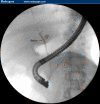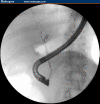Endoscopic and surgical management of primary sclerosing cholangitis
- PMID: 19099036
- PMCID: PMC2605132
Endoscopic and surgical management of primary sclerosing cholangitis
Abstract
Primary sclerosing cholangitis (PSC) is a rare, chronic cholestatic liver disease of uncertain etiology characterized by the destruction of the intrahepatic and extrahepatic bile ducts through inflammation and fibrosis. This development of inflammation and fibrosis leads to biliary complications including cirrhosis and ultimately death. Given the uncertainty surrounding the pathogenesis of the disease, many different medical therapies have been studied in the treatment of PSC. However, there currently are no effective medical therapies known to halt progression of disease. Additionally, patients with PSC often develop symptoms and complications that can be managed endoscopically or surgically. This review primarily focuses on endoscopic and surgical approaches that have been studied in the treatment of patients with PSC.
Figures
References
-
- Tischendorf JJ, Hecker H, Krüger M, Manns MP, Meier PN. Characterization, outcome, and prognosis in 273 patients with primary sclerosing cholangitis: A sngle center study. Am J Gastroenterol. 2007;102:107–114. - PubMed
-
- LaRusso NF, Shneider BL, Black D, et al. Primary sclerosing cholangitis: summary of a workshop. Hepatology. 2006;44:746–764. - PubMed
-
- Stiehl A. Primary sclerosing cholangitis: the role of endoscopic therapy. Semin Liver Dis. 2006;26:62–68. - PubMed
-
- Cullen SN, Chapman RW. Review article: current management of primary sclerosing cholangitis. Aliment Pharmacol Ther. 2005;21:933–948. - PubMed
-
- Silvis SE, Nelson DB, Meier PB. Ten-year response to stenting in a patient with primary sclerosing cholangitis. Gastrointest Endosc. 1998;47:83–87. - PubMed
Publication types
MeSH terms
LinkOut - more resources
Full Text Sources



